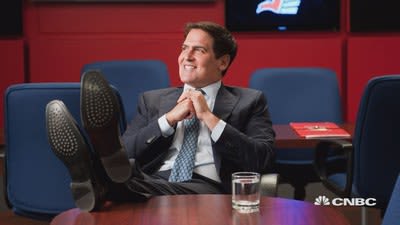Mark Cuban is the latest billionaire to weigh in on the growing income inequality between the richest and poorest Americans.
There is "no question" that the U.S. has a larger wealth gap than other developed nations, Cuban said in an interview with Fox Business at the SALT hedge fund conference in Las Vegas on Monday.
But while that widening wealth gap has helped give rise to Democratic Socialist politicians like presidential candidate Bernie Sanders and a push for progressive economic and political reforms, Cuban argues that the solution to income inequality can still be found in our current capitalistic economic model.
"I don't think anybody truly believes switching to socialism is going to bridge that gap," Cuban tells Fox Business. "But I do think it's a conversation that we need to have because income inequality leads to social disruption and the biggest risk to this… country and the biggest risk to all businesses… is violence and you know that's what we want to solve. The question is how do we do it?"
Cuban, who says he "leans libertarian historically," believes that capitalism is still the best answer to the country's growing income inequality issue. But he also believes in the need for what he calls "compassionate capitalism," which includes wealthy people like him sacrificing some of their wealth to help "bring the bottom up," he says.
"As someone who's wealthy, as someone who is looking to benefit the company, every capitalist has got to do the same thing," Cuban tells Fox Business. "We've got to say, 'Look, if we at the top make a little bit less and we help those at the bottom more, capitalism gets stronger. And it's not socialism, it's stronger and smarter and more, better capitalism.'"
While Cuban does not specify exactly how wealthier Americans can sacrifice some of their wealth to help narrow the wealth gap, other leaders from the worlds of business and politics have called for increased taxes on the wealthiest Americans to help solve the issue.

In April, hedge fund billionaire Ray Dalio called growing income inequality "an existential risk for the U.S." and he called for higher taxes on the richest Americans, like himself, to create a revenue stream that the government could reinvest in areas like public education and infrastructure.
Dalio, who founded hedge fund Bridgewater Associates out of a two-bedroom New York City apartment more than four decades ago and built it into the world's largest hedge fund, says he "lived the American dream … [But,] I think the American dream is lost."
Dalio is far from alone, as billionaires like Warren Buffett and Microsoft co-founder Bill Gates have also called for higher taxes on the country's top earners. And Cuban himself has also argued against cutting corporate tax rates, and he's said that wealthy people should pay their fair share of taxes.
"After military service, the most patriotic thing you can do as a wealthy person is pay your taxes," Cuban told CNN in 2016.
And much like Cuban, Buffett and Gates have also both argued in favor capitalism over socialism. "Some people think when you defend capitalism you're defending the tax rates," Gates told CNBC earlier this month in an interview alongside Buffett, with Gates adding that capitalism can still thrive even with higher tax rates on wealthy individuals helping to fund social programs.
Meanwhile, Buffett, who calls himself "a card-carrying capitalist," argues in the CNBC interview that free-market capitalism has helped spur ingenuity and economic growth in America. "We're just getting started with what capitalism can do," he says.
Don't Miss:
Billionaire Ray Dalio: 'Of course' rich people like me should pay more taxes
Amazon will pay $0 in federal taxes this year — and it's partially thanks to Trump
Like this story? Subscribe to CNBC Make It on YouTube!


